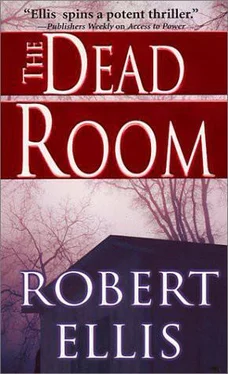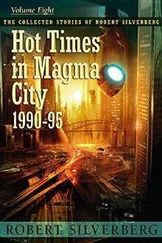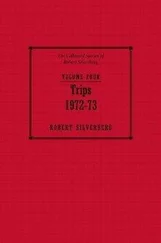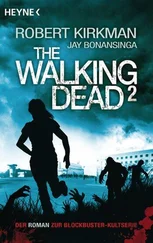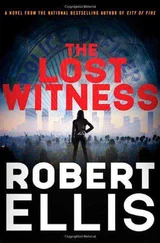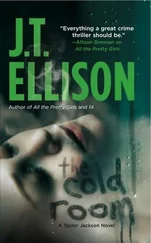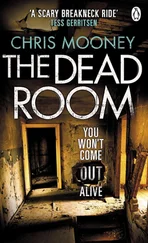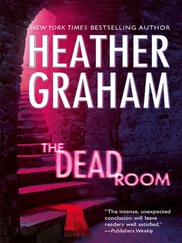Robert Ellis - The Dead Room
Здесь есть возможность читать онлайн «Robert Ellis - The Dead Room» весь текст электронной книги совершенно бесплатно (целиком полную версию без сокращений). В некоторых случаях можно слушать аудио, скачать через торрент в формате fb2 и присутствует краткое содержание. Жанр: Триллер, на английском языке. Описание произведения, (предисловие) а так же отзывы посетителей доступны на портале библиотеки ЛибКат.
- Название:The Dead Room
- Автор:
- Жанр:
- Год:неизвестен
- ISBN:нет данных
- Рейтинг книги:3 / 5. Голосов: 1
-
Избранное:Добавить в избранное
- Отзывы:
-
Ваша оценка:
- 60
- 1
- 2
- 3
- 4
- 5
The Dead Room: краткое содержание, описание и аннотация
Предлагаем к чтению аннотацию, описание, краткое содержание или предисловие (зависит от того, что написал сам автор книги «The Dead Room»). Если вы не нашли необходимую информацию о книге — напишите в комментариях, мы постараемся отыскать её.
The Dead Room — читать онлайн бесплатно полную книгу (весь текст) целиком
Ниже представлен текст книги, разбитый по страницам. Система сохранения места последней прочитанной страницы, позволяет с удобством читать онлайн бесплатно книгу «The Dead Room», без необходимости каждый раз заново искать на чём Вы остановились. Поставьте закладку, и сможете в любой момент перейти на страницу, на которой закончили чтение.
Интервал:
Закладка:
Teddy looked at Jill, typing something into the computer.
“What are you doing?” he asked.
“I found a Web site that publishes political contributions,” she said. “Andrews already has a lot of money in his war chest. The election’s more than a year off.”
“You mean the names are there? The contributors?”
Jill nodded.
“Read them,” he said. “All I need are last names.”
Teddy grabbed the printout. As Jill read the names aloud, he searched through Andrews’s cases. There were more than three hundred contributors, and it took time to page through the sheets of paper. But after an hour, he’d found a match. It was the only one. A case that Andrews had handled a year before he ran for district attorney. It wasn’t a felony case. Not even a misdemeanor. It was a case in which Andrews had decided not to prosecute. Instead, the accused was sent to a psychiatric facility for treatment. His name was Edward Trisco III.
Teddy glanced at the summary. Apparently, Edward was an aspiring artist with a drug problem.
FIFTY-THREE
He bolted up Seventeenth Street, zigzagging his way to Benny’s Cafe Blue at a full run. He had a photograph in his pocket of Edward Trisco III printed off the Internet. There had been a lot of pictures of Edward Trisco. More than they needed.
The Trisco family was a brand name.
They owned several technology companies and had a major interest in one of the state’s largest banks. Their political influence was substantial. Once Jill had a name, she typed it into the search window on the election Web site. The list that appeared was up to date and included every contribution the family had made over the past three presidential campaigns. Most of their individual contributions went to conservative candidates running for every type of office in every state in the nation. But the big money, some checks written for a million dollars or more, went directly to the national committee in Washington.
When Jill isolated their contributions to Alan Andrews, Teddy realized what a fool he’d been. Andrews hadn’t sent Edward Trisco to a psychiatric facility because the boy needed help and it may or may not have been the right thing to do.
It had been a pass.
Andrews received his first political contribution from the family two days after Edward’s arrest. A check in the amount of two hundred and fifty thousand dollars followed one week later. It was made out to the state party. Teddy knew all about soft money. Frank Miles, a media consultant from Washington, had been a guest lecturer on campus last year. The quarter million would have been laundered through the system. Once the money disappeared, it would have made a surprise return in the form of TV ads against Andrews’s opponent.
But this wasn’t about money. This was about Edward Trisco III. An aspiring artist who’d kidnapped a model. The model managed to escape and was unharmed. She hadn’t pressed charges. When Teddy finished reading the stories that appeared in the newspapers, it felt like lightning shooting through his veins.
He saw the cafe ahead. In spite of the traffic, he charged across the street and ripped open the door. As he hurried to the counter, he looked for the manager, Harris Carmichael, but didn’t see him. A young woman he recognized from last night stood behind the counter. Her hair was black and appeared dyed, the color of her eyes lost behind a pair of blue tinted glasses set in heavy black frames.
“Where’s Harris?” Teddy said.
She gave him a look and appeared frightened. Harris Carmichael must have filled her in after Teddy and Powell left last night.
“We don’t know,” she said, glancing at the kid mixing coffees on the far side of the counter. “He hasn’t shown up yet.”
“What time does he usually come in?”
“He opens the place,” she said. “Melvin called me this morning. I came down with the keys as soon as I could.”
“Did you try calling him?” Teddy asked.
“Nonstop,” she said. “No answer.”
Teddy could feel the pin pricks moving up his neck and through his scalp. He pulled the photo out of his pocket and unfolded it.
“I need to know if you’ve ever seen this man before,” he said.
She looked at the photograph of Edward Trisco III. She was staring at Trisco’s face, trying to remember. Teddy slid the paper across the counter and she leaned closer.
“He looks familiar,” she said. “But people come in every day. He’s not a regular.”
Teddy knew it would be tough. If what Harris Carmichael had said was true, Trisco sat at the corner table with his back to the room so that he could watch Rosemary Gibb work out at her club across the street.
“Do you remember serving anyone here that seemed strange?” Teddy said.
“We get a lot of those.”
“What about bad teeth?”
Her eyes pitched back to the photo and something clicked. Dread washed over her face.
“He comes in at night,” she said. “He smells like paint.”
“Where does he sit?”
The rush of adrenalin hit Teddy between the eyes as she pointed at the table by the window.
“There,” she said. “With his back turned.”
FIFTY-FOUR
The hills were snow covered and blushed out in a deep red from the afternoon sun sinking below the horizon. Splotches of purple marked the shadows. As Teddy gazed out the window from the passenger seat in Nash’s Lexus, the landscape appeared in a deep sleep and heavily bruised.
They were making the drive out to the Haverhills Psychiatric Facility. The institution was located about five miles south of Bryn Mawr Hospital in the suburbs. Teddy turned away from the sight of new homes under construction. The fields were gone. The woods. And he didn’t want to think about his father right now. Instead, he watched Nash launch the car through the winding two-lane road at high speed. The engine made a rushing sound. It felt like they were burning jet fuel.
Teddy had called Powell on his way over to Nash’s office. He didn’t tell her about identifying Edward Trisco at the cafe. He felt uneasy about it, but he didn’t. The DA’s office still had Holmes’s confession. As far as they were concerned, Holmes was the one. And Teddy felt he needed a better understanding of just what Alan Andrews had done before he said anything to her. He kept the conversation short, telling her that Harris Carmichael was missing. Still, he’d gotten the reaction he’d been hoping for. Powell wouldn’t be waiting the usual forty-eight hours to see if the man turned up. The search for Carmichael would begin immediately.
Nash pulled into the entrance and gave the guard at the booth their names. As the cast-iron gate opened, they started up the long drive. Teddy looked at the buildings set on top of the hill in the day’s last light. Although it was a modern facility, the institution had been operating for over a hundred years. And the main building, now relegated to administration offices, looked as if it had been around for even longer. There was a spooky feel to the place. At first he thought it might be because the Haverhills Psychiatric Facility was a madhouse for the criminally insane and looked the part. But it was more than that. Trisco had stayed here. Like tracking an animal in the field, they had their first sighting and were in the hunt.
Nash parked before the main building and they walked toward the entrance. The air was ice-cold, their breath venting their bodies in quick puffs. Nash pointed to a wing of the hospital that looked as if it was new. Not the building itself, but the words blasted into the concrete along the side. The wing had been dedicated to the Trisco family.
“Now we know how he got out,” Nash said with his brow raised.
Читать дальшеИнтервал:
Закладка:
Похожие книги на «The Dead Room»
Представляем Вашему вниманию похожие книги на «The Dead Room» списком для выбора. Мы отобрали схожую по названию и смыслу литературу в надежде предоставить читателям больше вариантов отыскать новые, интересные, ещё непрочитанные произведения.
Обсуждение, отзывы о книге «The Dead Room» и просто собственные мнения читателей. Оставьте ваши комментарии, напишите, что Вы думаете о произведении, его смысле или главных героях. Укажите что конкретно понравилось, а что нет, и почему Вы так считаете.
